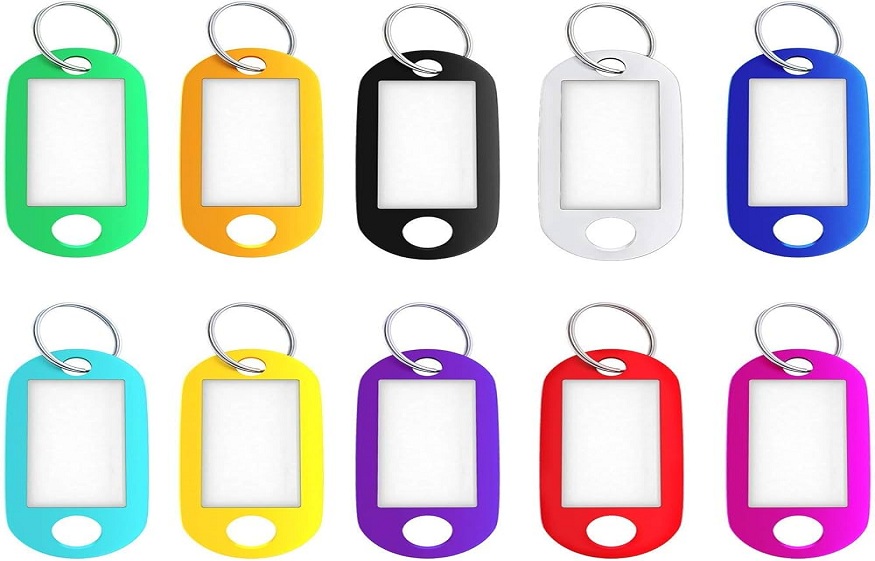Custom plastic key tags have become incredibly useful tools with a wide range of functional and promotional uses in today’s more individualized marketplace. Custom key tags are useful and leave a lasting impact on everyone from companies looking to promote their brands to organizations in charge of access control systems, from stores offering loyalty programs to event planners delivering unique mementos. These ostensibly straightforward accessories have a great deal of responsibility: protecting priceless assets, embodying the brand of the firm, and enduring normal handling conditions. When choosing the best custom plastic key tags, it’s important to carefully consider a number of important aspects to make sure they fulfill criteria and offer the most value.
-
Material Selection and Durability Characteristics
The selection of proper personalized luggage tags bulk serves as the fundamental starting point for superior key tags because it determines their endurance besides appearance and operational capability. The exceptional durability along with versatile design capabilities make PVC polyvinyl chloride retain its popularity among users today. The material shows resistance to water harm and enables complex printing elements. High-end appearance and improved clarity separate acrylic substitutes from their higher price point. The design limitations of high-density polyethylene matter less because this material delivers superior impact strength suitable for industrial use. Polycarbonate enables barcode scanning through its blend of durability with transparent appearance making it suitable for applications requiring these features. The durability of a material depends strongly on its thickness since thicker dimensions withstand harsh use better but thinner profiles offer lightweight cost-effective solutions.
-
Design Features and Customization Options
Custom plastic key tags’ aesthetic and practical design components turn ordinary accessories into effective marketing and identifying tools. When choosing the ideal imprint size, take the primary viewing distance into account. While distant watching necessitates bigger, greater contrast components, close-range seeing allows for finer details. The choice of color has a big influence on visibility and brand alignment; full-color printing reproduces intricate graphics and gradients with amazing realism, while simple spot colors provide affordable possibilities. Specialized finishing choices, such as embossing, improve identification without visual reference by creating tactile distinction. Equal weight must be given to functional design features. Attachment techniques vary in their convenience and security profiles, ranging from ordinary chain holes to specialized snap hooks and swivel connections. By using sequential numbering or customized barcode implementations, serialization characteristics make tracking easier.
-
Production Methods and Quality Assurance Standards
Custom plastic key tags’ practical qualities and appearance are greatly influenced by manufacturing procedures. Although injection molding produces products with great durability and dimensional consistency, it is only cost-effective for larger volumes due to the significant setup expenditure required. Die-cutting techniques provide cost-effective substitutes for designs that are simpler and lack dimensional complexity. Photographic-quality reproduction is made possible by digital printing technology, although protective coatings may be necessary to ensure picture lifetime. Although there aren’t many color selections, traditional screen printing offers remarkable endurance. Physical testing to verify attachment point strength and overall structural integrity should be part of production quality verification methods, as should visual inspection techniques verifying color consistency and imprint clarity. Dimensional tolerances necessary for applications requiring scanner compatibility are maintained by established quality control procedures.
-
Quantity Requirements and Economic Considerations
When purchasing bespoke plastic key tags, production volume has a considerable impact on both unit economics and the customisation possibilities available. Design preparation, equipment configuration, and quality control system development are all included in the setup costs of standard manufacturing processes. These costs are usually spread out over the whole production amount through fixed setup fees or higher unit pricing at lower volumes. In order to account for these economic realities, the majority of manufacturers set minimum order numbers, which typically range from several hundred to several thousand pieces, depending on production techniques and design complexity. At higher quantity thresholds, volume-based pricing tiers usually offer notable unit cost savings, which frequently make bigger purchases significantly more cost-effective per unit. When deciding on the best order numbers, organizations should carefully weigh their current demands against their projected future requirements, taking storage capacity and possible design obsolescence into account.
-
Environmental Impact and Sustainability Factors
Sustainability concerns have moved beyond mere legal compliance to become core company principles that impact purchase decisions as a result of growing environmental awareness. Conventional plastic key tags add to ongoing waste streams, which has led to the creation of environmentally friendly substitutes with less of an impact. Options for recycled plastic use post-consumer materials, which lowers the need for virgin plastic while preserving performance attributes that are on par with those of conventional formulations. Specialized additives in biodegradable materials initiate decomposition at particular environmental conditions while affecting performance differently from typical materials. The rising concern about fossil fuels led various manufacturers to start producing plant-based bioplastics extracted from renewable sources instead of petroleum feedstocks. The production process needs equal attention for sustainability because energy-efficient manufacturing combined with waste reduction methods and water conservation techniques reduce environmental impact.
Conclusion
A careful assessment of a wide range of aspects, such as material qualities, design features, production techniques, quantity needs, and environmental concerns, is necessary when choosing the best personalized stuffed animal that looks like your pet. Instead of settling for the compromises that come with generic goods, companies that thoroughly evaluate these criteria before to purchase create identification solutions that properly meet their operating requirements. For businesses with clear identification needs, the improved functionality, application-specific optimization, and possible branding advantages of custom solutions offer higher long-term value, even if they usually require a larger planning commitment than conventional options.




